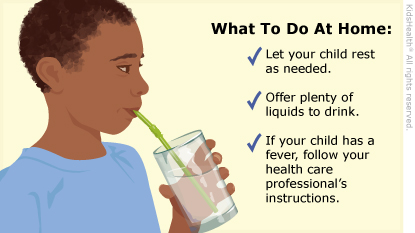Possible Zika Virus Infection: How to Care for Your Child
Zika virus is spread by mosquitoes in tropical and moderate climates. A mosquito that bites an infected person picks up the virus. If the mosquito then bites someone else, that person can be infected with the virus. Zika virus also can spread from an infected person to another person through sex, and from an infected pregnant woman to her developing baby.
Many people who get Zika virus, including children and babies, don't get any symptoms and may not even know they're infected. When symptoms do show up, they're usually mild, just as in many other viral illnesses, and last a few days to a week. In most cases, Zika does not cause any serious health problems. Symptoms can include:
During pregnancy, Zika sometimes may cause problems with the developing baby's brain growth. That may result in a small head size (microcephaly) and problems with development.
Your health care provider may have asked questions about symptoms and any recent travel, and believes that your child likely has Zika virus. A sample of your child's blood or urine (pee) may have been sent to the lab and tested for Zika virus and other similar viruses that are spread by mosquitoes.
There's no medicine to get rid of a Zika infection, but symptoms go away on their own in about 2 to 7 days. In the meantime, you can help your child feel more comfortable.


-
Let your child rest as needed.
-
Offer your child plenty of liquids to drink.
-
If your child is uncomfortable from fever, a medicine may help:
-
If your child has an ongoing medical problem (for example, a kidney, liver, or blood problem): Check with the health care provider before giving medicine for fever.
-
For children younger than 3 months: Check with the health care provider before giving medicine for fever.
-
For children older than 3 months: You may give acetaminophen (such as Tylenol®, Panadol®, or a store brand).
-
Don't give ibuprofen (such as Advil®, Motrin®, or a store brand) unless a lab test confirms that your child doesn't have dengue virus, which can cause similar symptoms to Zika. If the test shows that your child doesn't have dengue, and your child is older than 6 months, you may give either ibuprofen or acetaminophen.
-
Don't give aspirin to your child or teen. Aspirin has been linked to a rare but serious illness called Reye syndrome.

Your child:
-
has symptoms that get worse or don't improve
-
feels weak
-
has trouble walking
-
has pain, numbness, or tingling
-
is bleeding or bruising easily

Your child:

How can we help reduce the spread of Zika? To help prevent the spread of Zika:
-
Use insect repellent as directed. Choose one with 10% to 30% concentration of DEET (not recommended for babies younger than 2 months).
-
Wear long-sleeved shirts and long pants.
-
Stay in homes with air conditioning or window screens.
-
Empty standing water (such as children's swimming pools, buckets, pet bowls, and rainwater in flower pots and old tires), where mosquitoes breed.
If your teenager has the virus, talk to them about preventing the spread of Zika by not having sex (vaginal, oral, or anal) or by always using a latex condom during sex (vaginal, oral, or anal).